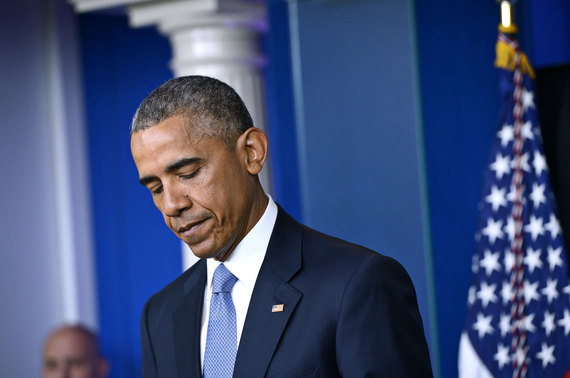It was one of the more solemn news conferences that President Barack Obama delivered throughout his presidency. An innocent American citizen, a 73-year old USAID worker named Warren Weinstein who was held by al-Qaeda in Pakistan for four years, was accidentally killed by his own government last week in a drone operation that took place this past January. And President Obama was at the White House Briefing Room to apologize to the Weinstein family.
Although the operation killed a high-profile member of the Al-Qaeda terrorist network-- a strike that occurred after analysts scoured hundreds of hours of footage and analyzed video feeds of the compound from all directions -- the killing of Weinstein and fellow hostage, Italian Giovanni Lo Porto, clouded that success. U.S. intelligence officials had no idea that the two men were in the building until months later, when a combination of intercepted communications and footage observing two extra bodies pulled from the rubble of the compound confirmed that a terrible mistake happened.
The president was visibly grief stricken when he announced this news to the American people at the White House on April 24. "I profoundly regret what happened." President Obama said. "On behalf of the United States government, I offer our deepest apologies to the families."
Over the past thirteen years, there have been hundreds of civilians reportedly killed by the use of unmanned aerial vehicles, but the death of Warren Weinstein was especially tragic for the U.S. Government. Weinstein was an American victimized by a group that prides itself on slaughtering as many Americans as it can; he was an old man whose family tried everything possible to get him back; and he was working for the U.S. government on a contract to make the lives of Pakistan's citizens a little better. All of these facts, when joined with the fact that intelligence personnel simply didn't know that Weinstein was being held in that specific location, personify a heartbreaking story.
Unlike the wars in Iraq and Afghanistan, which were wholesale products of the Bush administration and to which the Obama administration inherited, President Obama cannot simply revert back to the playbook of blaming the previous president. While President George W. Bush was the first U.S. Commander-in-Chief to use an armed drone in the war against al Qaeda (the first was reportedly a 2002 strike in Yemen, which killed top al Qaeda Commander Salim al-Harithi), Obama increased the tactic exponentially over the first two years of his administration. According to data compiled by The Long War Journal, there were 53 drone strikes conducted within the Pakistani tribal regions in 2009, and 117 conducted in 2010 (compare these figures to the 35 strikes in 2008, the highest tally in a single year from the Bush administration). In Yemen, there have been a total of 111 drone attacks during the first six and a half years of the Obama administration, compared to a grand total of one during George W. Bush's entire eight years. In other words, as Iraq is to George Bush, drones are to Barack Obama.
In addition to the fact that an American hostage was tragically killed by his own government, the reality that drones are inextricably linked to his presidency could very well be why President Obama looked so shaken during his press conference. He clearly recognizes that, were it not for his caution in deploying U.S. forces on the ground, the drone program being utilized today probably would not be so popular and universally known around the world as an effective way to take terrorist commanders off the battlefield. Despite dozens of successful operations, Weinstein is a tragic victim of Obama's preferred vehicle for warfare.
A day after disclosing the deaths of Weinstein and Lo Porto, the president addressed the intelligence professionals tasked with fighting the war on terrorism. Every war has its ups and downs, he said, and when mistakes occur, they will be investigated thoroughly and fixed quickly in order to prevent a similar incident from happening again. "[W]e're not cavalier about what we do, and we understand the solemn responsibilities that are given to us," remarked the president. "And our first job is to make sure that we protect the American people."
The accidental killing of Warren Weinstein is nothing short of a painful, but unfortunately unavoidable, consequence of the drone wars. But for President Obama, most members of Congress, and a majority of the American people, the use of armed, robotic aircraft is a far better alternative than sending American personnel into a dangerous warzone to kill a terrorist suspected of plotting against the United States. Mr. Weinstein's death, however, reminds us that even the most tactically efficient weapon in the 21st century is not perfect. Deadly mistakes can still happen. In fact, in war, they are guaranteed to happen.

